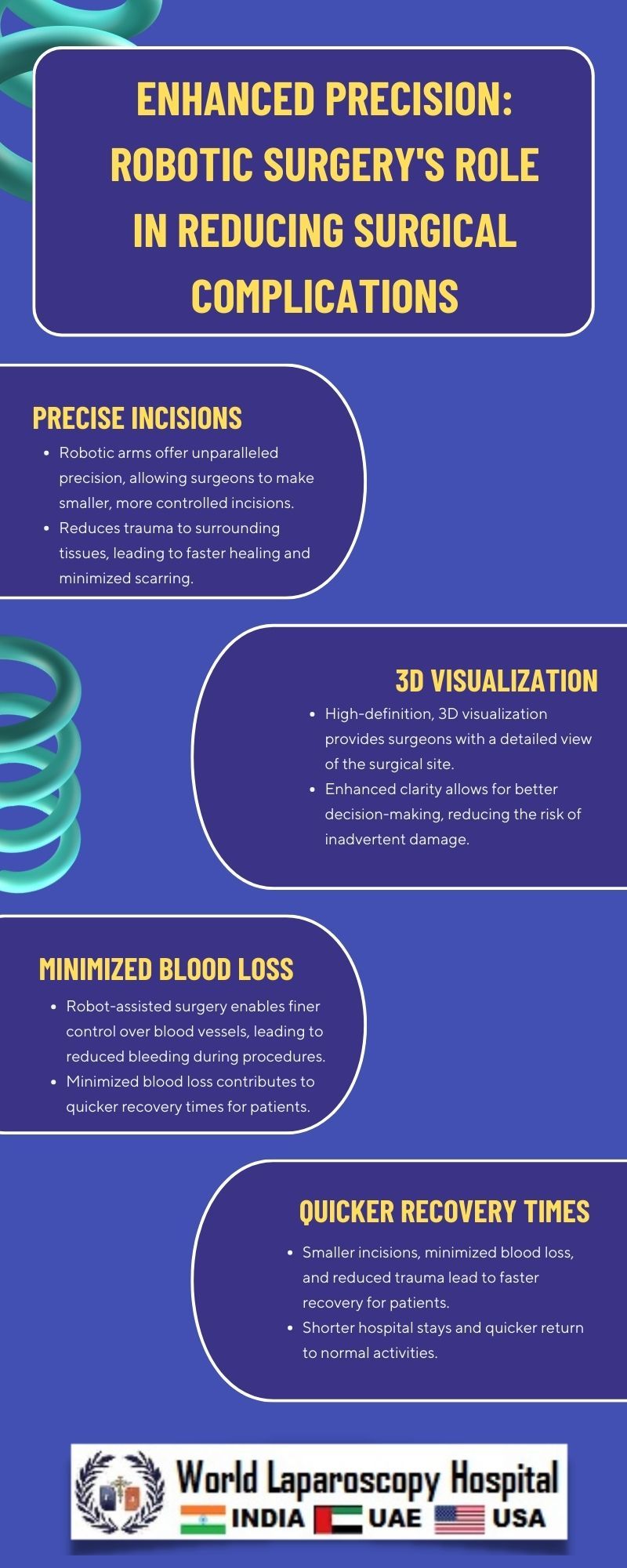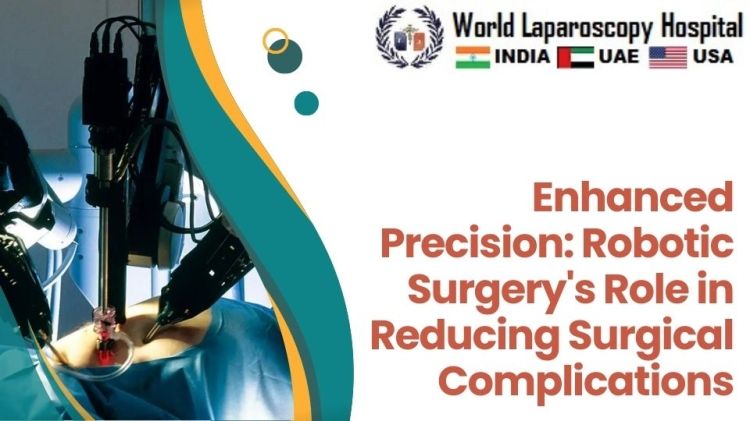Enhanced Precision: Robotic Surgery's Role in Reducing Surgical Complications
Introduction
In the realm of modern medicine, the marriage of technology and healthcare has given rise to groundbreaking advancements. One such innovation that stands at the forefront is robotic surgery, a revolutionary approach reshaping the landscape of surgical procedures. With its ability to enhance precision and reduce surgical complications, robotic surgery is paving the way for a new era in medical interventions.

Evolution of Robotic Surgery
Robotic surgery, also known as robot-assisted surgery, has evolved over the years as a result of technological breakthroughs. The da Vinci Surgical System, introduced in the early 2000s, marked a turning point by providing surgeons with a robotic platform to perform minimally invasive procedures. This system incorporates robotic arms controlled by a console, offering unparalleled precision and maneuverability.
The Mechanism Behind Robotic Precision
Surgical Robotic Systems
The core of robotic surgery lies in the sophisticated robotic systems employed. These systems consist of robotic arms equipped with specialized instruments, controlled by a console operated by the surgeon. The robotic arms mimic the surgeon's hand movements with precision, offering a high degree of accuracy during procedures.
3D Imaging and Visualization
Robotic surgery integrates advanced imaging technologies, including 3D visualization. Surgeons benefit from a detailed, three-dimensional view of the surgical site, allowing for better spatial awareness and enhanced decision-making. This level of visualization contributes significantly to reducing the risk of complications.
Advantages of Robotic Surgery in Precision
Enhanced Dexterity
One of the primary advantages of robotic surgery is the heightened dexterity it provides to surgeons. The robotic arms can perform intricate movements with a range of motion beyond the capabilities of the human hand. This enables surgeons to navigate through complex anatomical structures with greater ease, reducing the likelihood of errors.
Tremor Elimination
Human hands are prone to slight tremors, especially during delicate procedures. Robotic systems are designed to filter out these tremors, ensuring steady and precise movements. This eliminates the inherent limitations associated with human hand tremors, contributing to enhanced precision during surgery.
Reduced Fatigue
Traditional open surgeries or even laparoscopic procedures can be physically demanding for surgeons, leading to fatigue over time. Robotic surgery mitigates this issue by providing a more ergonomic setup. Surgeons can operate from a comfortable console, reducing physical strain and allowing for prolonged, focused precision during procedures.
Applications Across Surgical Specialties
Urology
Robotic surgery has found extensive application in urological procedures, such as prostatectomies and kidney surgeries. The intricate nature of these surgeries requires precision, and robotic systems have demonstrated superior outcomes, including reduced blood loss and quicker recovery times.
Gynecology
In gynecological surgeries, such as hysterectomies, robotic-assisted procedures offer a minimally invasive alternative. The precision afforded by robotic systems is particularly beneficial in delicate gynecological procedures, minimizing the risk of complications and promoting faster patient recovery.
Cardiothoracic Surgery
The complexities of cardiothoracic surgery demand a high level of precision. Robotic surgery has shown promise in procedures like mitral valve repairs and coronary artery bypass surgeries. The ability to navigate within the confined space of the chest with enhanced precision has led to improved patient outcomes.
General Surgery
Robotic surgery is not limited to specialized fields; it has made significant strides in general surgery as well. Procedures such as gallbladder removal and colorectal surgeries benefit from the precision and minimally invasive nature of robotic-assisted techniques.
Reducing Surgical Complications
Minimizing Blood Loss
One of the critical factors contributing to postoperative complications is excessive blood loss during surgery. Robotic surgery's precision allows for meticulous control over blood vessels, significantly reducing the risk of hemorrhage. This is especially vital in surgeries with a high potential for bleeding.
Lowering Infection Rates
The minimally invasive nature of robotic procedures often translates to smaller incisions. Reduced incision size minimizes the exposure of internal organs to external contaminants, lowering the risk of postoperative infections. This is a crucial factor in reducing overall surgical complications.
Quicker Recovery Times
Robotic surgery's precision not only reduces the risk of complications during the procedure but also contributes to faster recovery times for patients. Smaller incisions, less trauma to surrounding tissues, and reduced blood loss collectively lead to a swifter postoperative recovery compared to traditional open surgeries.
Challenges and Considerations
Cost Implications
While the benefits of robotic surgery are evident, the initial costs associated with acquiring and maintaining robotic systems can be substantial. Hospitals and healthcare institutions must weigh these costs against the long-term advantages and improved patient outcomes to justify the investment.
Surgeon Training
Operating robotic systems requires specialized training for surgeons. The learning curve associated with mastering the robotic console and adapting to the unique dynamics of robotic surgery is a consideration that healthcare institutions must address. Adequate training ensures that surgeons can fully capitalize on the capabilities of robotic systems.
Technological Advancements and Integration
The field of robotic surgery is dynamic, with continuous technological advancements. Healthcare institutions need to stay abreast of these developments to ensure they are utilizing the latest and most advanced robotic systems. Integration challenges may arise when upgrading or transitioning to newer robotic technologies.
Future Trends and Innovations
Artificial Intelligence Integration
The integration of artificial intelligence (AI) into robotic surgery holds the promise of further enhancing precision. AI algorithms can analyze real-time data from the surgical site, providing insights and suggestions to the surgeon. This symbiotic relationship between robotics and AI has the potential to elevate surgical outcomes to new heights.
Telesurgery
Advancements in communication technologies are paving the way for telesurgery, allowing surgeons to perform procedures remotely. Robotic systems, coupled with high-speed and low-latency networks, enable surgeons to conduct surgeries from a different location. This has significant implications for expanding access to specialized surgical care in remote or underserved areas.
Conclusion
Robotic surgery's role in reducing surgical complications is transformative, offering unprecedented precision and improved patient outcomes across various medical specialties. As technology continues to advance, the integration of robotics, artificial intelligence, and telecommunication holds the potential to redefine the landscape of surgical interventions. While challenges such as cost and training persist, the long-term benefits and advancements in healthcare justify the ongoing exploration and adoption of robotic surgery as a cornerstone of modern medical practice.


